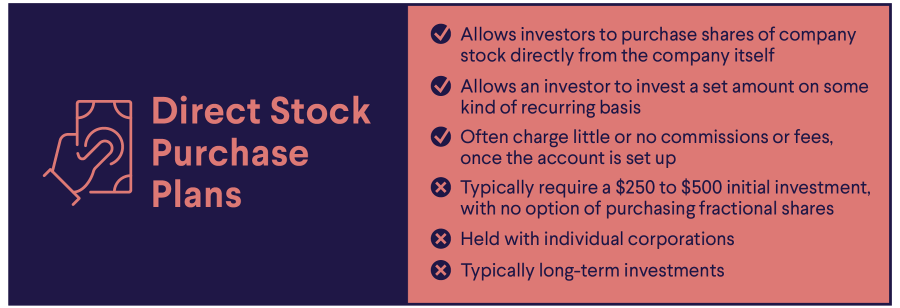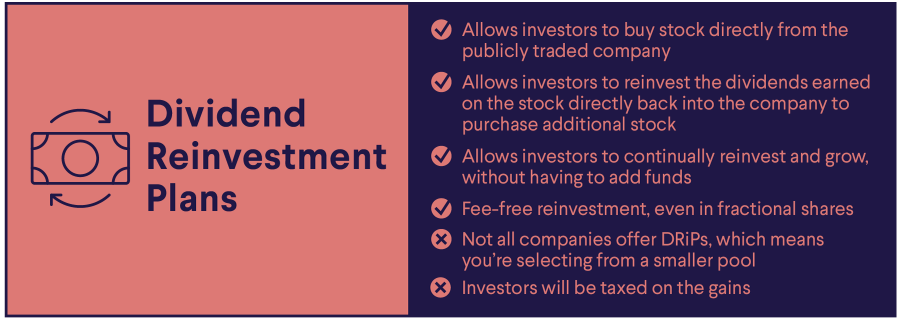Buying stocks without a broker can be done, typically through the use of a self-administered brokerage service, or one of a couple of different types of investing plans. Buying stocks may help you get started on the path to building wealth. And just like hiring professional movers can help make relocating less stressful, purchasing stocks through a broker can make the process of diversifying your portfolio easier.
That, however, can involve paying commissions and fees to trade stocks and other securities. Potential investors who are trying to curb investment costs might wonder how to buy stocks online without a broker being involved.
Key Points
• Buying stocks without a broker is possible through online brokerage accounts, dividend reinvestment plans, and direct stock purchase plans.
• Full-service brokers may offer additional services like trading advice and personalized investment strategies.
• Direct stock purchase plans allow investors to buy shares directly from the company, while dividend reinvestment plans reinvest dividends to purchase more stock.
• Online brokerage accounts often offer convenience, lower fees, and the ability to customize investment strategies.
• Each option has its pros and cons, and investors should consider their preferences and goals before choosing a method.
How Can I Buy Stocks Without a Broker?
It is possible to buy stocks without a broker. In fact, there are three alternatives to using a full-service broker: opening an online brokerage account, investing in a dividend reinvestment plan, and investing in a direct stock purchase plan. So, the short answer is yes, you can buy stocks without a broker.
But it may be useful to understand why some investors do choose to use a broker when making stock purchases.
Get up to $1,000 in stock when you fund a new Active Invest account.*
Access stock trading, options, alternative investments, IRAs, and more. Get started in just a few minutes.
Benefits of Using a Broker to Buy Stocks
As their name implies, stockbrokers can help broker trades of stocks and other securities on behalf of their clients. In return, they may earn commissions for making those trades. But that’s just one thing a full-service broker can do. A stockbroker’s role may also involve:
• Offering trading advice to clients based on their experience with the stock exchange and education.
• Giving their clients additional tips and suggestions, like what investments they should buy and sell or when it makes sense to do so.
• Building relationships with their clients to better understand and inform individual investment strategies.
A stockbroker’s salary is largely dependent on commissions, which means they’ve got to be pretty good at what they do to make a living. Investors can benefit from the education, training, and experience a stockbroker accumulates over the course of their career.
That being said, for most stockbrokers, their payment comes from your trades, which means a client has to pay their stockbroker every time they buy, sell, and trade. For some, the knowledge of a stockbroker is worth the cost of doing business. For others, the idea of DIY investing is more appealing. It all depends on personal preference.
💡 Quick Tip: When you’re actively investing in stocks, it’s important to ask what types of fees you might have to pay. For example, brokers may charge a flat fee for trading stocks, or require some commission for every trade. Taking the time to manage investment costs can be beneficial over the long term.
How to Buy Stocks Online Without a Broker
DIY investors have several options for buying stocks without brokers online. Here’s a closer look at how each one works.
Direct Stock Purchase Plans
Direct Stock Purchase Plans (DSPPs) allow investors to purchase shares of company stock directly from the company itself. Specifically, trades are completed through a transfer agent.That means you could buy stocks without a broker, full-service or online, to complete the transaction.
DSPPs can be offered by companies that are publicly traded on a stock exchange, though not all publicly traded companies offer DSPPs. Each company can determine what minimum investment to require for initial and subsequent stock purchases.

Pros of Buying DSPPs
Buying DSPPs comes with its own unique set of advantages:
• Passive investing: Many DSPPs plans allow an investor to invest a set amount on some kind of recurring basis — sort of a “set it and forget it” strategy.
• Lower fees: DSPPs often charge little or no commissions or fees, once the account is set up.
• An investor might get a discount: Depending on the company a person invests in, they might be offered a slight discount, between 1% and 10%, for investing directly.
Cons of Buying DSPPs
While DSPPs have benefits, there are some drawbacks as well:
• Higher upfront costs: There is typically a cost associated with starting a DSPP account, and DSPPs typically require a $250 to $500 initial investment, with no option of purchasing fractional shares.
• It’s another account: DSPPs are held with individual corporations. So if an investor has DSPP holdings with multiple companies, each will live on the company’s individual platform.
• They’re typically long-term investments: DSPPs don’t offer the same flexibility and speed of an online broker. For that reason, they’re typically considered more appropriate for a long term investment.
Dividend Reinvestment Plans
Dividend Reinvestment Plans (DRiPs), share many similarities to DSPPs — in fact, some DSPPs offer DRiP programs. With a DRiP, investors can still buy stock directly from the publicly traded company, but they can also reinvest the dividends earned on the stock directly back into the company to purchase additional stock.

Pros of DRiP Programs
In addition to the benefits of DSPPs, DRiPs have a few to offer on their own if you’d like buy stock without a broker:
• Automated, compounded growth: Reinvesting dividends is not dissimilar to compound interest. DRiPs allow investors to continually reinvest and grow, without having to add funds.
• Fee-free reinvestment, even in fractional shares: Investing the dividends comes fee-free. Investors are also usually offered the opportunity to buy fractions of a share.
Cons of DRiP Programs
DRiPs share many of the same drawbacks as DSPPs, but also have a few specific to them:
• Limited selection: Not all companies that offer DSPPs offer DRiPs, which means you’re selecting from a smaller pool.
• Dividends are still taxable: Although the cash is automatically reinvested in a DRiP, investors will still be taxed on the gains. That means they may want to have liquidity elsewhere to pay the tax.
Online Brokerage Account
Online brokerage accounts offer the convenience of being able to buy stocks online without a traditional full-service broker (and the typical traditional broker fees). Think of it as the difference between dining at a full-service restaurant versus a self-serve buffet.
After opening an account with an online brokerage,an investor can tell their broker what they want to buy, and how much of it. Then the broker completes the order.
Depending on the online broker, there may be low or no fees associated with making a trade.

Pros of Investing with an Online Broker
It might sound pretty easy, but online investing has both pros and cons. Here are a few of the advantages:
• Low fees: When it comes to online investing, people can typically expect to pay lower fees. Many online firms do not charge commissions.
• DIY investing: There’s a lot of freedom that can come with an online brokerage account. An investor gets to choose, creating a customized plan.
• On-demand investing: As long as the markets are open, an investor can ask for trades through their digital brokerage account.
Cons of Investing with an Online Broker
Depending on an investor’s personality and preferences, there may be a few drawbacks to using an online broker:
• It’s all on the investor. Online investing can give investors a lot of choice and freedom, but without the expertise of qualified financial professionals, some investors might be left to research and form a strategy on their own. For some, this might feel stressful.
• It’s for the long term. Since online investing is on-demand, a person can sell whenever they like. That can be a challenge for an investor if patience isn’t their strong suit.
Test your understanding of what you just read.
The Takeaway
It’s possible to buy stocks without a full-time broker. For instance, investors can use an online brokerage account to trade stocks on their own, or invest using different types of investment plans. But there can be pros and cons to each.
While there are some advantages to using a traditional full-service broker to purchase stocks, you don’t necessarily need one in order to invest. However, if you don’t feel comfortable doing it yourself, you can speak with a financial professional for guidance.
Invest in what matters most to you with SoFi Active Invest. In a self-directed account provided by SoFi Securities, you can trade stocks, exchange-traded funds (ETFs), mutual funds, alternative funds, options, and more — all while paying $0 commission on every trade. Other fees may apply. Whether you want to trade after-hours or manage your portfolio using real-time stock insights and analyst ratings, you can invest your way in SoFi's easy-to-use mobile app.
Opening and funding an Active Invest account gives you the opportunity to get up to $1,000 in the stock of your choice.¹
About the author
You may also be interested in:
INVESTMENTS ARE NOT FDIC INSURED • ARE NOT BANK GUARANTEED • MAY LOSE VALUE
For disclosures on SoFi Invest platforms visit SoFi.com/legal. For a full listing of the fees associated with Sofi Invest please view our fee schedule.
Financial Tips & Strategies: The tips provided on this website are of a general nature and do not take into account your specific objectives, financial situation, and needs. You should always consider their appropriateness given your own circumstances.
¹Probability of Member receiving $1,000 is a probability of 0.026%; If you don’t make a selection in 45 days, you’ll no longer qualify for the promo. Customer must fund their account with a minimum of $50.00 to qualify. Probability percentage is subject to decrease. See full terms and conditions.
SOIN0523122



